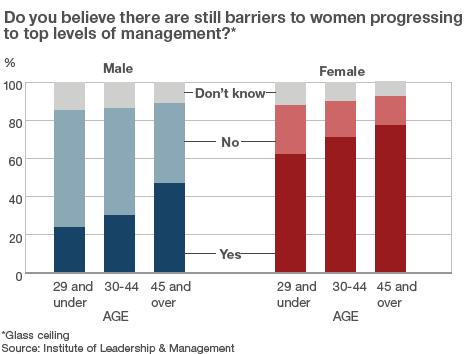Female managers say glass ceiling intact - survey
- Published

Women are still one step behind when it comes to top-level promotion, the survey suggests
Nearly three-quarters of women say they still face barriers to top-level promotion in the UK, a survey suggests.
Of the nearly 3,000 managers questioned, 73% of women agreed that the glass ceiling still exists, whereas only 38% of men did.
The research for the Institute of Leadership and Management comes ahead of Lord Davies's report on boardroom gender equality due later this week.
Some 47% of women - but only 24% of men - backed quotas for female executives.
Views on positive discrimination were even more polarised among the over-45s.
But "positive action" to boost the role of women met with broader support, backed by 62% of women and 42% of men.
'Incompetence'
Sheelagh Whittaker, non-executive director of Standard Life, told BBC Radio 4's Today programme that quotas were the answer.
"I am a big supporter of quotas. I believe that we will only have true equality when we have as many incompetent women in positions of power as incompetent men," she said.

But Penny de Valk, the Institute's chief executive, said it would not answer all of the problems.
"Quotas may be seen as the quickest solution, and some countries - notably Norway - have introduced them with some success," she said.
"However, although they drive compliance, they do not necessarily drive a commitment to the more fundamental changes that are required."
Early indications suggest that Lord Davies's report to the government will set a two-year time frame for UK companies to increase the number of women on their boards, she noted.
Career fear
Besides the perceived discrimination, the survey suggests that lower confidence and career ambition may also be holding women back.
Compared with men, women were found to aspire more to running their own company than achieving higher rank within a firm.
Women also seemed to be more risk averse, taking a more cautious approach to seeking promotion, according to the survey of the Institute's members conducted last December and January.
Some, including Baroness Bottomley - the former Conservative minister Virginia Bottomley - believe the disparity is beginning to disappear.
She is now with the headhunting firm Odgers-Berndtson.
"I really think we're getting there. If you take my own example, when I got into the House of Commons, one in 25 MPs was a woman; it's now more than one in five," she told the BBC.
"The world is changing. We didn't used to have any ordained priests, we've now got a huge number of women priests."
The disparity in career prospects persists despite women making up 49% of the workforce.
Yet despite gaining 57% of first-class degrees in the UK last year, only 12% of FTSE 100 directors are female, according to a report by the Cranfield School of Management.